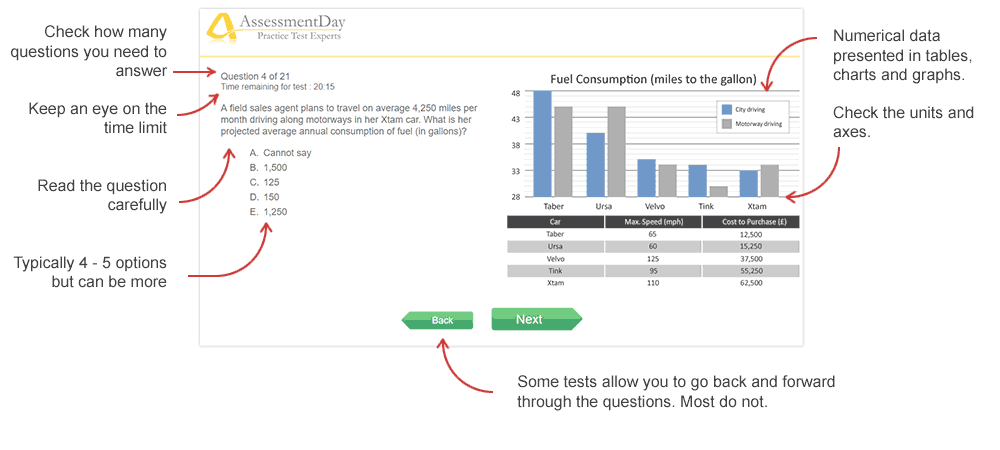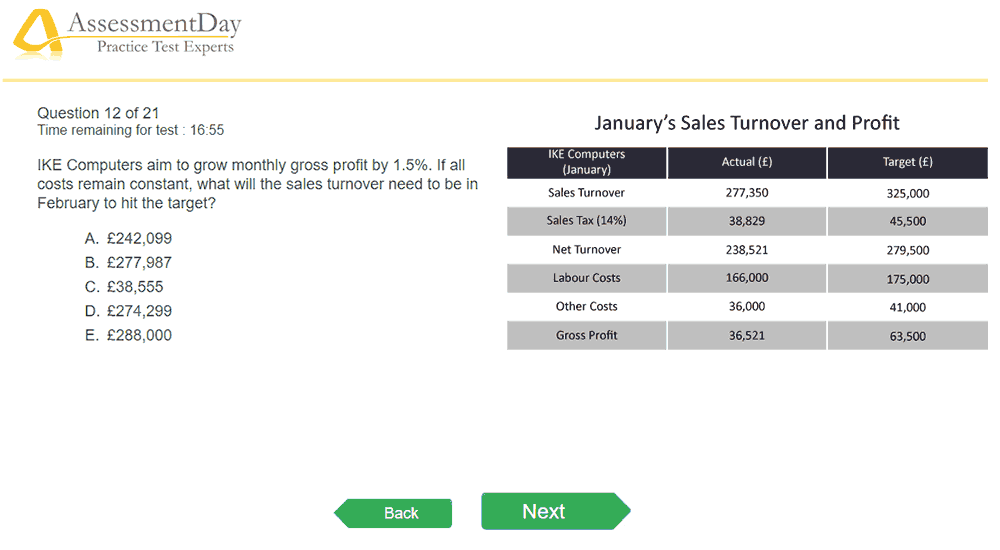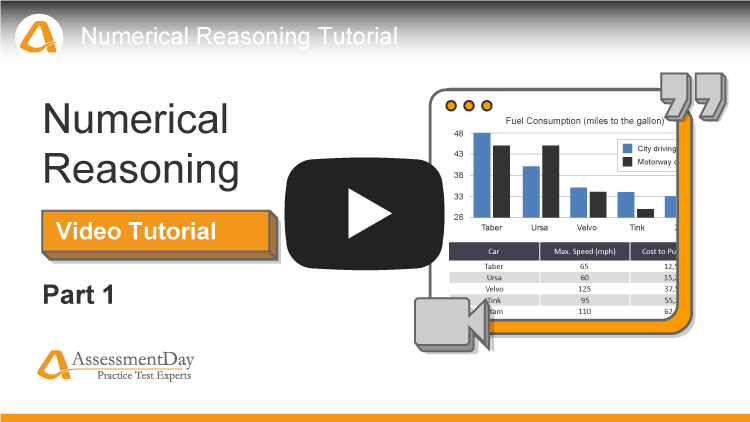Numerical Reasoning Tests
To help you pass your numerical reasoning test, use these preparation assessments, advice, and solutions to help you increase your score.



Page contents:
Jump to:Updated:
What is numerical reasoning?
Numerical reasoning tests assess a candidate's ability to handle and interpret numerical data. You will be required to analyse and draw conclusions from the data, which may be presented in the form of tables or graphs.The tests are timed and in a multiple choice
Did You Know
It's a competitive job market out there, and employers are increasingly turning to numerical tests to help them make choices about whom to invite to interview.
Numerical reasoning tests differ from the sort of numerical tests you may be familiar with from GCSE or A level exams. The tests you will face are designed to measure your ability to problem solve, often mimicking the type of analysis you will be required to undertake in your future role e.g. Comparing the productivity of two different branches of a company. This type of workplace numerical data can often be tricky to understand if you are not familiar with it, so it's extremely important to take practice tests to familiarize yourself with these beforehand.
The following images explain the format of an example numerical reasoning question:


What are numerical reasoning tests like?
By taking example numerical reasoning tests you will become familiar with the question format. Luckily for you most employers use a similar format of numerical reasoning test, which means it's easy to get some realistic practice beforehand.
The important thing to remember about numerical reasoning tests used for employment selection is that they are not the same as a math test. You will not have to remember formulae. Especially as they usually allow for calculators. The typical characteristics of a numerical reasoning test include but are not limited to:
PRO TIP
You can practice numerical reasoning assessments to get a feel for the format of the questions. Fortunately for you, most firms use a similar format for their numerical reasoning tests, making it simple to prepare beforehand.
The great thing about the numerical reasoning tests used for employment selection is that they are not the same as a maths test. You don't have to remember complex formulae or write long proofs. The important characteristics of a numerical reasoning test are:
- Multiple choice answers - no longhand answers or showing your working-out.
- No prior knowledge required - no equations to memorize (or surreptitiously write on your arm).
- Strict time limits - some are generous while some are very short.
- Relevant to the workplace - modern tests are based on the kind of numerical information you would deal with in the job.
- Based on only the information given - you should not make assumptions about data you are not given.
Numerical Reasoning Video Tutorial - Part 1
This is part 1 of our two part numerical reasoning tutorial. Watch it now to be talked through a sample numerical reasoning question:

Free numerical reasoning test
Here you can take our free numerical test to see the current level of your numerical ability. These tests come with questions and answers pdf for offline use.
Free Sample Numerical Reasoning Test
FreeThis shortened numerical test has 12 questions and will take 12 minutes to complete. We rate this as medium difficulty and is typical of the same level as graduate employer numerical reasoning tests.
Numerical Reasoning Test 1
Premium- 30 questions
- 30 mins
Numerical Reasoning Test 2
PremiumNumerical Reasoning Test 3
PremiumNumerical Reasoning Test 4
PremiumWhat math is required for a numerical reasoning test?
The math required in a numerical psychometric test is determined by the difficulty of GCSE level. The part required from you, is to interpret and figure out what calculation is required from the question, and under pressure of time.
Key takeaway
If there is a style of question that you find most challenging, we recommend you take a moment to focus your practice on that type of question. And as stated above, remember that you are usually allowed to use a calculator on your test.
The correlation between people doing well on their psychometric tests and performing better at their job is clear. This is why employers use them.
Sometimes the difficulty of the psychometric tests between graduate and professional level is no different. The difference lies in the norm group - reflecting the caliber of candidate they are trying to select.
Numerical Formula Sheet
Numerical Reasoning Test Formula Sheet
FreeWe have compiled a document explaining the most complex numerical formulas you are expected to know, such as how to calculate ratios in numerical reasoning tests. You can download it below.
How to pass numerical reasoning tests
Practice is so useful in preparation for the reasoning test as it helps reduce the element of surprise and will give you the confidence to perform at your best. Be that as it may, there are some other, simple ideas you can use to help prepare from your test.
- Learn about the test you are going to take - ask the employer what test(s) your are taking. Perhaps ask for the test provider. This way, you can find out precisely how long the test will be and how many questions. Also, this will tell you what practice material will be appropriate.
- Get enough sleep - not being completely alert and awake will likely impact negatively on your performance. We recommend you try and get a good night's sleep before your assessment day.
- Make sure you arrive early - this applies really only to tests you are going to take at an assessment centre. Get there early so you can try to relax and concentrate on your task ahead rather than panicking about making sure you are there on time, and out of breath.